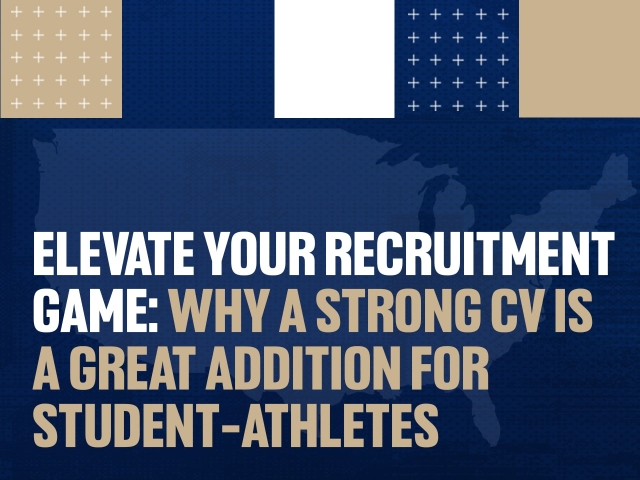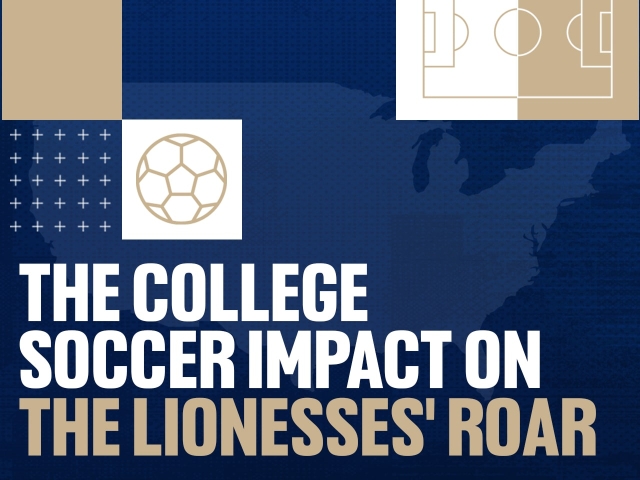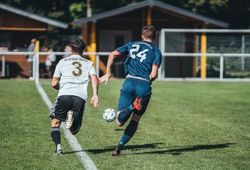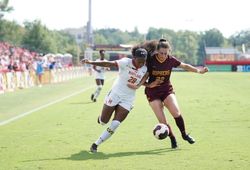Craig Hughes is a former
FirstPoint USA soccer scholarship recipient, former FirstPoint member of staff, and now assistant soccer coach at Midland University, Nebraska. Coach Hughes recently dropped in for a catch up, and to write this blog post about what to expect from pre-season:
For an international freshman, pre-season can be the toughest and most demanding time of their career. Not only is the training physically tough but their body is trying to adjust to a different climate, time zone and possibly a new diet. A new player from oversees is undoubtedly thrown in at the deep end and must hit the ground running in order to make an impact in their first season.
The US college season is short but intense, with so many games crammed into a short season. Depending on the schedule some teams are asked to play two games in 48 hours in the scorching heat. Later on in the season national tournament games can also be back to back with every game being a must win. With these physical demands, the player can't just rely on natural ability, they need to be able to match the fitness and hunger of their opponents and teammates.
Although pre-season can be tough, if a player is prepared and willing to work hard it is a very rewarding couple of weeks, which really helps them kick on. Getting a good pre-season and making a good impression on the coaching staff sets a player up for a great season.
Preparation
Some people have the view that the summer is just about BBQs, beer, and relaxing, and that pre-season is for getting their fitness back. This view is very much outdated in sports and in particular at the collegiate level. It is important to have some down time away from soccer in the summer, however having six weeks of no real fitness work is not the way any serious athlete operates. Pre-season only lasts two weeks, this is two weeks for the coach to get the team up to speed and playing well together in preparation for the season starting, not a time to play catch up on fitness after doing nothing all summer. With the season being so short and games coming very quickly the coach needs players who are in good shape and are ready for the challenge. Come into pre-season unfit and any player will struggle to keep up with the pace. Not only can this lead to a lack of sharpness and confidence it can lead to the player having to do extra to get up to speed, with pre-season already asking so much of a players body, trying to cram extra work in can often lead to players burning out or suffering injuries as a result.
The opening days
On the first day the team will usually have a meeting, where coaches can introduce themselves, discuss the goals for the season, discuss any team rules, deal with any paperwork and then lay out the schedule for pre-season. After that it's on to the part everyone dreads, the fitness tests. These will vary from school to school however the majority use standard tests like the 2 mile and the bleep tests. The two mile is probably the most common, self explanatory a timed two mile run where most coaches will set a goal of around 12 minutes. Depending on the level and the coach there may be extra fitness tests for those who don't make it in the designated time. These fitness tests are really important when it comes to first impressions with the coach, it lets the coach know who has been working hard over the summer. Some coaches even pick their original squads based on these times, if a player doesn't meet the required time he could be starting the season on the sidelines.
Daily Routine
Again a standard day in pre-season varies depending on the coach and what he/she believes benefits the team. Many college teams will do three sessions per day, others will do two sessions but make them a bit tougher and possibly add in a recovery session or tactical/film meeting in. Some coaches will have sessions in the middle of the afternoon where it can get extremely hot, others will only train in the mornings and the evenings. What could dictate it is the schedule for the season, if the team has a few afternoon games then the coach will want his team to get used to working in the heat, if all the games are in the evening then he/she might decide to avoid the afternoon heat.
What a daily routine could looks like:
- 7:30-8:00am Breakfast
- 8:30-10:00am Fitness Session
- 12:00-1:00 pm Lunch
- 2:00-3:30pm Technical Session
- 5:00-6:00 pm Diner
- 7:00-8:30 pm Games(11 v 11 or small sided)
Pre-Season Scrimmages
Scrimmages is the term used for pre-season friendlies and just like at any club these are used to get match fitness, try different players, help the team gel and basically measure where the team is at before the competitive games start. These scrimmages are the first chance for any new player to show the coach what they can do and stake a claim for their place in the team. Most teams will play 2/3 official scrimmages however they might organise games against local club sides, alumni or inter squad games to get more games in. Usually the first game will be against a lower standard opposition, in this game expect there to be lots of changes and lots of players to feature. As it moves on to the second and third scrimmage it generally becomes a lot more competitive and the opposition will be a lot tougher. The coach will then be making less changes and starting to find out what his starting XI and first team squad will be for the opening game of the season. The results in pre-season aren't the main thing however any team looks to go into the new season full of confidence with a few wins and some good performances under the belt.
Other activities
During the two weeks of pre-season there will be quite a few other commitments especially for a new player. With the team there will probably be meetings, team photographs, physical examinations and possibly some community involvement activities. As a new student there are also likely to be new student orientation days, meetings with admissions, paperwork, and moving in days. For an international there are other things to consider, like getting your social security number, setting up a bank account, getting everything set up for the new room. Straight away a student athlete has a lot going on and time management is important even before classes and the season start.
Nutrition, Rest and Recovery
Many athletes can make the mistake of thinking they want to eat less during pre-season to make sure they get the benefits and aren't aren't carrying extra weight. In reality this is the worst thing an athlete can do. With so much energy and calories being burned during sessions it is important that there is fuel going into the body. Most school cafeterias will have pasta available every day and athletes will eat as much of it as possible along with other healthy foods to keep their energy up. Drinking plenty of water is also vitally important in the heat. The coach will usually allow quite a few water breaks during sessions and athletes should take full advantage of this. During meals and in between sessions athletes should also get as much fluids on board, water and gatorade will help keep hydrated, drinking chocolate milk can also be good for recovery.
It is important athletes also make use of things like ice baths and swimming pools to help their muscles recover. With trainers on hand athletes should take any advice they can get and have any injuries checked out. It can be tempting after training to just go back to the room for a game of FIFA however 10 extra minutes in the ice bath or taking a bit of extra time to stretch can help prevent injuries.
Getting the right amount of sleep is also very important. Getting to bed at a decent time and getting naps in-between sessions usually helps. This is not something an athlete usually has to force themselves to do after a tough session.
It is important to be disciplined during pre-season, with a new situation and plenty going on around campus it can be tempting to get right into the social side of things. A new student will be desperate to get to know people in their dorms and enjoy the campus atmosphere, however soccer should take priority especially during such a demanding period. I would highly recommend staying off the alcohol during this time as there isn't much worse than an early fitness session with a hangover! There will be plenty of time to party and enjoy the social side of college later down the line.
Enjoying the process
I believe that one of the biggest battles a player faces during pre-season is the psychological side. if they are dreading the thought of training in the heat and talking themselves out of a session the legs will start to feel even heavier and it can be really hard to get going. Every player should try to enjoy pre-season, after all it is two weeks constantly being involved in soccer and being around teammates. There is no classes or homework to worry about, just getting out on the field every day. I would encourage all players if they are not enjoying pre-season to think of what else they could be doing, they could be waking up early for a really tough shift in a dead end job. They should also value the fact they are fit and healthy and able to play, there are so many people would love to be out there working hard but can't due to long term injuries. Student athletes should always remember how unfortunate they are to have such a great opportunity and experience ahead of them, one which many people can only dream of.
Pre-season is a very character building and team bonding experience. Every player goes through it together and helps push each other on when things get tough. It is important to always remember why as a player and as a team you are going through the process and it will all be worth it for a successful season.
We’d like to thank Craig for taking the time to write this post!
Do you think you have what it takes to secure a scholarship to study in the USA while playing your favourite sport? Apply now!




